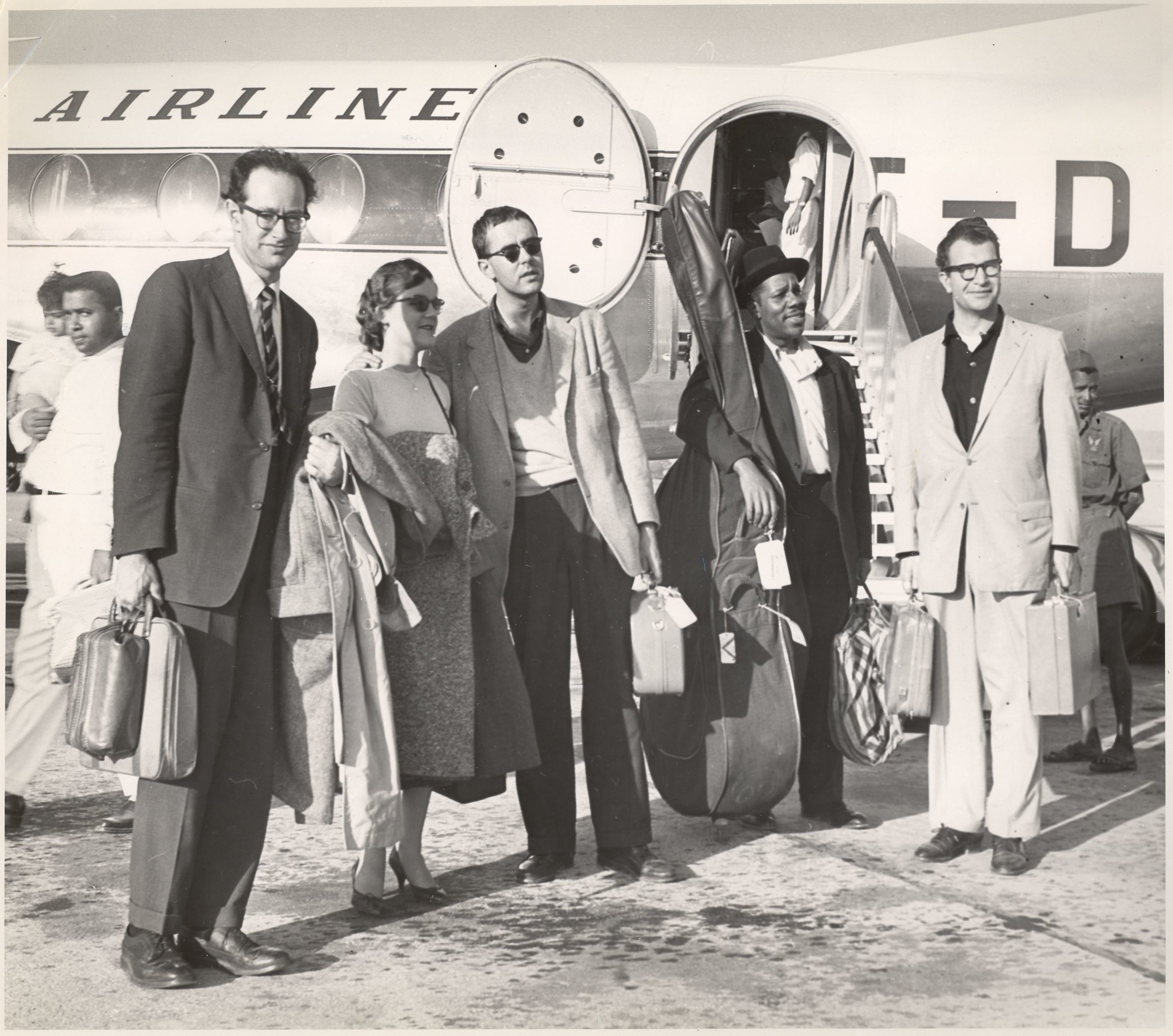Cold War Politics and the Civil Rights Movement Collide In New PBS Doc About the Jazz Ambassadors
WDCB's Gary Zidek talks to filmmaker Hugo Berkeley about his new documentary THE JAZZ AMBASSADORS.
LISTEN HERE
"What I looked for and hoped that I would find as I went through the process, was that emotional connection. How did these musicians feel about what they were being asked to do?" - Hugo Berkeley talking about the reservations some of the Jazz Ambassadors had.
Director Hugo Berkeley and Bass Player Bill Crow.. Photo Credit: Henry Adebonojo
The documentary shows how rising tensions caused by the Cold War led to the creation of the Jazz Ambassadors program. Starting in the mid-50's, America’s most influential jazz artists, including Dizzy Gillespie, Louis Armstrong, Duke Ellington, Benny Goodman and Dave Brubeck, agreed to take part in the initiative and travel the globe as cultural ambassadors.
Dizzy Gillespie poses with the Shah of Iran, Mohammad Reza Pahlavi (right), in Iran, 1956. Credit: Malcolm Poindexter III / Courtesy of the Institute of Jazz Studies, Rutgers University
Dizzy Gillespie was named the first Jazz Ambassador.
Dizzy Gillespie (with turmpet), singer Dottie Salter (holding the snake) and trombone player Melba Liston (at back), charm a cobra in Karachi, Pakistan, 1956. Credit: Malcolm Poindexter III / Courtesy of the Institute of Jazz Studies, Rutgers University
Over the decade, more than 20 tours featuring renowned American jazz musicians visit over 100 countries, even while the performers themselves questioned representing a nation still struggling to deal with segregation and intolerance.
Louis Armstrong (center) is greeted by nine local trumpet players at the airport in Accra, The Gold Coast (present day Ghana) in 1956. Credit: Courtesy of the Louis Armstrong House Museum
While performing in the British West African colony of The Gold Coast (now Ghana), Louis Armstrong dedicates the iconic song “Black and Blue,” about the agony of racism, to Prime Minister Kwame Nkrumah.
Louis Armstrong (center) plays in Accra, The Gold Coast (present day Ghana) in 1956 to a crowd estimated at 100,000. He's flanked by clarinetist Edmond Hall (left) and trombonist Trummy Young (right). Credit: Courtesy of the Louis Armstrong House Museum
Louis Armstrong hams it up on radio DJ Willis Conover's Voice of America show "Music USA." Credit: Courtesy of the Willis Conover Collection, University of North Texas Music Library
After his participation in the Jazz Ambassadors program, Dave Brubeck created a musical based on his experience titled THE REAL AMBASSADORS.
The Dave Brubeck Quartet on tour in 1958; right to left: Dave Brubeck, Eugene Wright, Joe Morello and his wife Jean, and Paul Desmond. Credit: Courtesy of the Brubeck Collection, Holt-Atherton Special Collections, University of the Pacific Library. (c) Dave Brubeck.
Dave Brubeck performs in Warsaw, Poland in April 1958. Credit: Marek A. Karewicz / Courtesy of the Brubeck Collection, Holt-Atherton Special Collections, University of the Pacific Library. (c) Dave Brubeck.
The U.S. State Department ended the Jazz Ambassadors program when Duke Ellington’s tour of the Middle East and India was tragically cut short by JFK’s assassination.
Duke Ellington arrives in Lebanon during his 1963 State Department tour of India and the Near and Middle East. Credit: Courtesy of the J. William Fulbright Collection, University of Arkansas Libraries
Duke Ellington listens to musicians in Pakistan, 1963. Credit: Courtesy of the Duke Ellington Collection, Archives Center, National Museum of American History, Smithsonian Institution

















